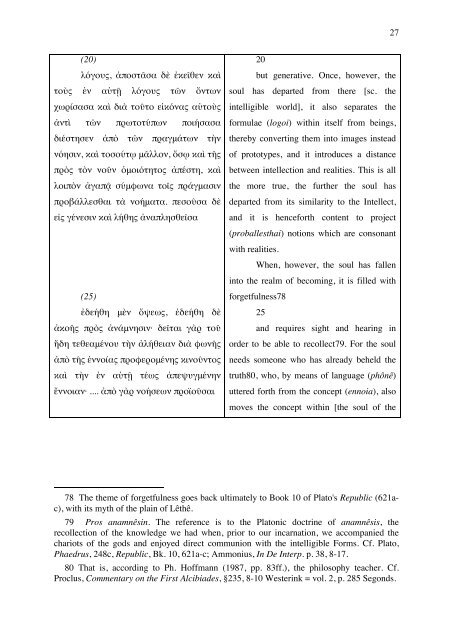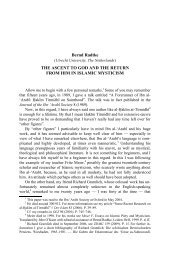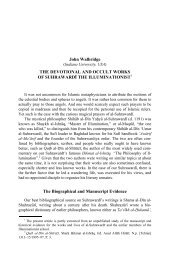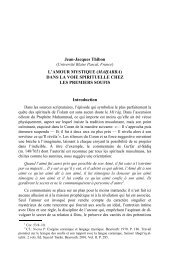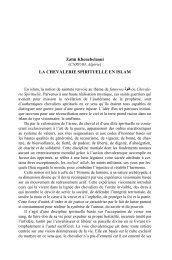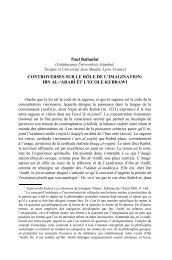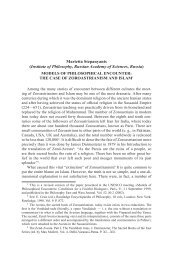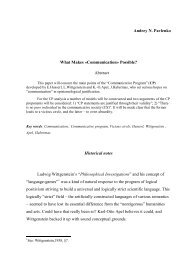Bothius talk DEF
Bothius talk DEF
Bothius talk DEF
You also want an ePaper? Increase the reach of your titles
YUMPU automatically turns print PDFs into web optimized ePapers that Google loves.
27<br />
(20)<br />
λόγους, ἀποστᾶσα δὲ ἐκεῖθεν καὶ<br />
τοὺς ἐν αὐτῇ λόγους τῶν ὄντων<br />
χωρίσασα καὶ διὰ τοῦτο εἰκόνας αὐτοὺς<br />
ἀντὶ τῶν πρωτοτύπων ποιήσασα<br />
διέστησεν ἀπὸ τῶν πραγμάτων τὴν<br />
νόησιν, καὶ τοσούτῳ μᾶλλον, ὅσῳ καὶ τῆς<br />
πρὸς τὸν νοῦν ὁμοιότητος ἀπέστη, καὶ<br />
λοιπὸν ἀγαπᾷ σύμφωνα τοῖς πράγμασιν<br />
προβάλλεσθαι τὰ νοήματα. πεσοῦσα δὲ<br />
εἰς γένεσιν καὶ λήθης ἀναπλησθεῖσα<br />
(25)<br />
ἐδεήθη μὲν ὄψεως, ἐδεήθη δὲ<br />
ἀκοῆς πρὸς ἀνάμνησιν· δεῖται γὰρ τοῦ<br />
ἤδη τεθεαμένου τὴν ἀλήθειαν διὰ φωνῆς<br />
ἀπὸ τῆς ἐννοίας προφερομένης κινοῦντος<br />
καὶ τὴν ἐν αὐτῇ τέως ἀπεψυγμένην<br />
ἔννοιαν· .... ἀπὸ γὰρ νοήσεων προϊοῦσαι<br />
20<br />
but generative. Once, however, the<br />
soul has departed from there [sc. the<br />
intelligible world], it also separates the<br />
formulae (logoi) within itself from beings,<br />
thereby converting them into images instead<br />
of prototypes, and it introduces a distance<br />
between intellection and realities. This is all<br />
the more true, the further the soul has<br />
departed from its similarity to the Intellect,<br />
and it is henceforth content to project<br />
(proballesthai) notions which are consonant<br />
with realities.<br />
When, however, the soul has fallen<br />
into the realm of becoming, it is filled with<br />
forgetfulness78<br />
25<br />
and requires sight and hearing in<br />
order to be able to recollect79. For the soul<br />
needs someone who has already beheld the<br />
truth80, who, by means of language (phônê)<br />
uttered forth from the concept (ennoia), also<br />
moves the concept within [the soul of the<br />
78 The theme of forgetfulness goes back ultimately to Book 10 of Plato's Republic (621ac),<br />
with its myth of the plain of Lêthê.<br />
79 Pros anamnêsin. The reference is to the Platonic doctrine of anamnêsis, the<br />
recollection of the knowledge we had when, prior to our incarnation, we accompanied the<br />
chariots of the gods and enjoyed direct communion with the intelligible Forms. Cf. Plato,<br />
Phaedrus, 248c, Republic, Bk. 10, 621a-c; Ammonius, In De Interp. p. 38, 8-17.<br />
80 That is, according to Ph. Hoffmann (1987, pp. 83ff.), the philosophy teacher. Cf.<br />
Proclus, Commentary on the First Alcibiades, §235, 8-10 Westerink = vol. 2, p. 285 Segonds.


